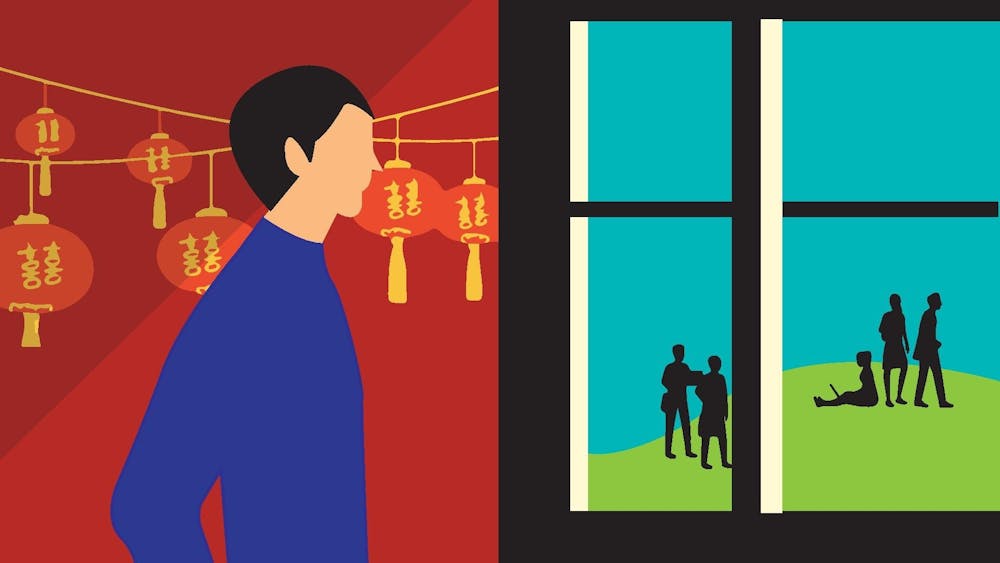
Having been an international student since high school, I celebrated Lunar New Year for the fifth consecutive time without my family. Just like all other Quakers who observe this holiday, I was trapped on campus, embraced by a bizarre and complicated feeling of jubilee, homesickness, and stress. Unlike Western holidays like Christmas and Thanksgiving, which happen over extended breaks and provide ample time for people to go home to celebrate with their families, Lunar New Year can be a uniquely emotional experience for the Asian community at Penn.
Marking the turning point on the lunar calendar, Lunar New Year is a holiday that is widely celebrated in East and Southeast Asia. Although different families may have varying traditions, the underlying theme is the reunion with loved ones. Unlike most Western holidays where it is common, but not necessary, to celebrate with one’s entire extended family, the Lunar New Year’s most important aspect is for people to return home, united with their family. No matter where they are, millions of people travel in the bleak winter every year, sometimes across thousands of miles, so that they can see their family, even if only for one night. With Lunar New Year’s Eve being on a Monday this year, even most domestic students were unable to make travel plans to celebrate with their families. However, many students still managed to adapt to the situation.
College first-year Nicole Zhao recalled her experience about the holiday, mentioning that “luckily, with video calls being available in the modern age, I was still able to talk with my family and see their faces.” For many Asian students, this experience of separation, along with other shared traditions, can be powerful bonding tools that bring the community closer. But just as the physical separation of close family members during the pandemic attests to the limit to which the Internet can replace physical interaction, celebrating a cultural holiday remotely with family is always going to be different than that in person.
Nevertheless, students who celebrate Lunar New Year organize events with other members of their communities during this time of festivity. College first-year Alan Zhang recalled his experience, describing how, “For the first time ever, I spent [Lunar New Year] with friends on campus away from my family members eating hotpot.” Self-organized celebrations like having a hot dinner were common on campus. And celebrating with people who come from different cultures is itself significant for the Asian community to recognize Lunar New Year as a holiday that is observed by many different communities instead of a homogeneous one.
For many students, celebrating Lunar New Year on campus appears to be strange because it is only acknowledged by the few in the Asian community who celebrate it. It is surprising that the University itself never sent any message or announcement recognizing the holiday. College first-year Joanna Xiang was underwhelmed by the University’s lack of recognition, stating that, “I’m pretty disappointed that the school really didn’t make a lot of effort to promote the cultural holiday.” While certain Asian-interest groups were promoting the holiday by hosting events like lion dance performances in multiple dining halls last week, Penn's choice of staying silent during this holiday, or any other cultural holidays, undermines the mission of cultural inclusiveness and makes students of minorities feel more alienated.
Like any major holiday, celebrating Lunar New Year ideally means having fun and not thinking about the next midterm or project due the following week. Many students who celebrate the holiday experience struggle with completing their homework during the week of Lunar New Year, thereby making the experience stressful. While some other universities have professors offering deadline extensions for students who observe Lunar New Year, most Penn students in the Asian community still had to grind through their work for the next school day, interfering with preparations for the holiday. In the wake of Congresswoman Grace Meng’s recent bill to make Lunar New Year a federal holiday, Penn should at least offer accommodations to students whose celebration come into conflict with their academic work, and such an action can be the first step to show Penn’s respect to people’s observance of this holiday.
The Lunar New Year is a special occasion that is central to the identity of many Asian students at Penn. But it is important to recognize that many students had to celebrate this holiday while attending school, unlike traditional American holidays. Penn needs to be more responsible for promoting holidays like the Lunar New Year as part of its mission of inclusion.
TONY ZHOU is a College first-year from Zhejiang, China. His email address is hyy0501@sas.upenn.edu.
The Daily Pennsylvanian is an independent, student-run newspaper. Please consider making a donation to support the coverage that shapes the University. Your generosity ensures a future of strong journalism at Penn.
Donate



